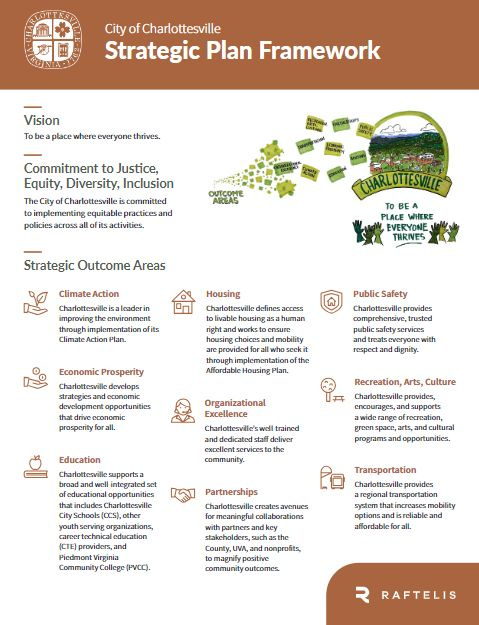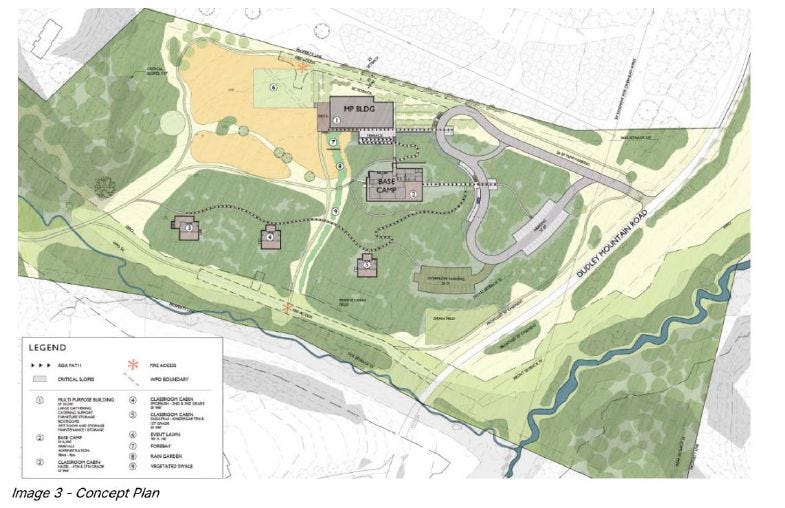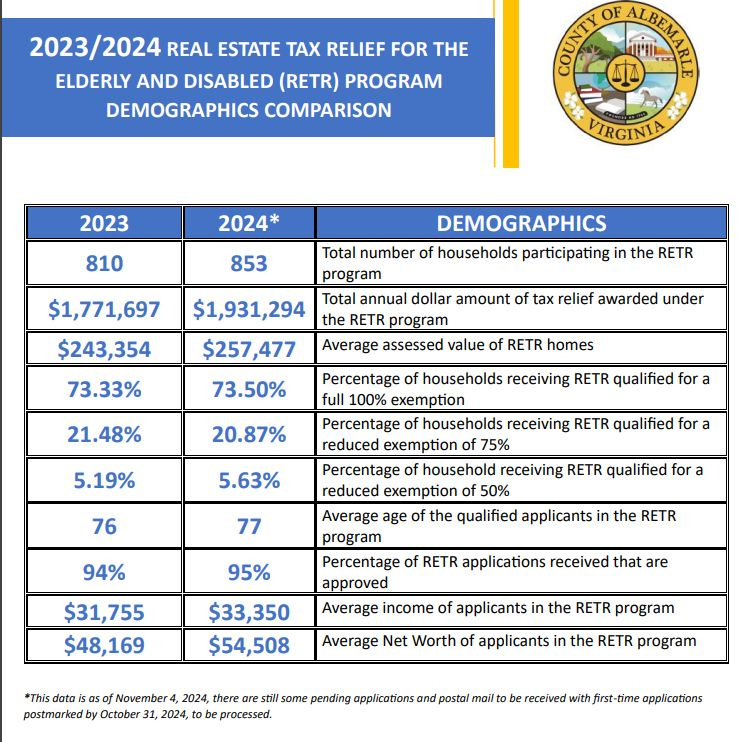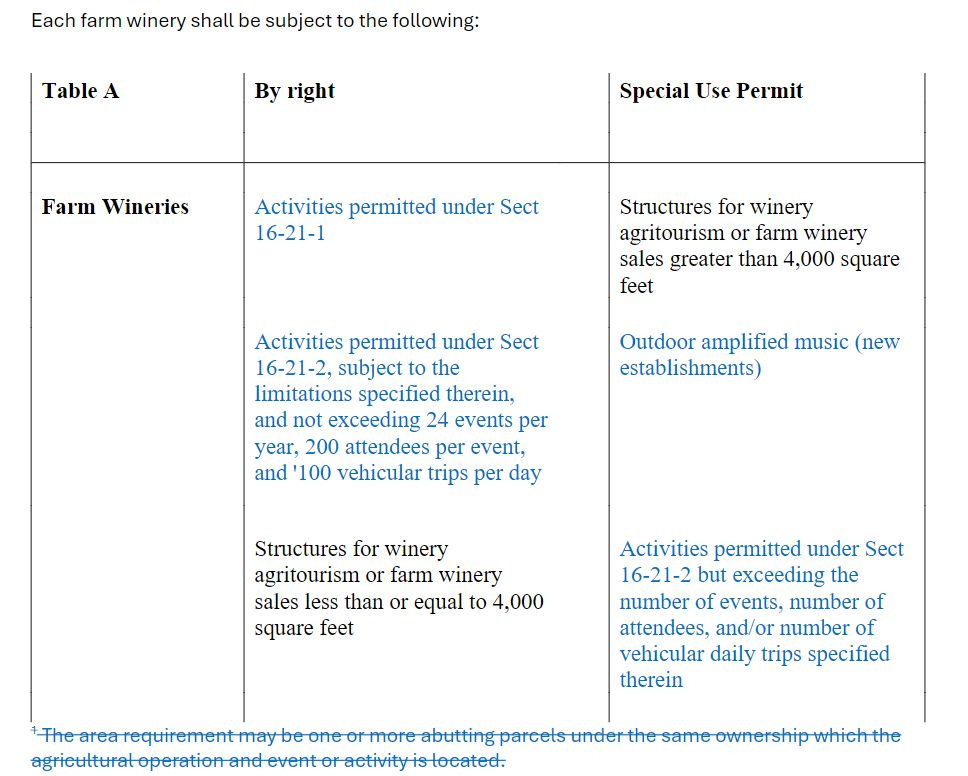Week Ahead for November 18, 2024: Charlottesville BAR to review proposal for 184 foot tall tower on site of Violet Crown theater; Fluvanna Supervisors to consider elimination of rural clustering
Plus: Charlottesville City Council may get more details on how City Manager Sam Sanders will fund various "community interventions"
There are multiple ways to write stories about local government. If you are a regular reader of this newsletter, you will know I focus on the public process of how decisions get made by local governments.
Since going independent four and a half years ago, hundreds of people have opted to support the work financially. They are supporting beat journalism. That’s where someone watches systemic processes and tries to document as much of what happens over time. That used to be commonplace but is less so now.
In my career, I’ve contributed to a public record of sorts, one I keep as public as possible by deciding not to put my work behind a paywall. There are supporters who would prefer I do, but my source material mostly comes from the public domain.
There are multiple ways of covering local government, and I am only in control of mine.
If you’ve not read the Sunday newsletter before, this is a very lengthy summary of what’s coming up at meetings of local government in the Thomas Jefferson Planning District Commission. That consists of the counties of Albemarle, Fluvanna, Greene, Louisa, and Nelson as well as the city of Charlottesville.
Over time you’ll perhaps see the connections as elected bodies in all six make decisions about where people are going to live, how people are going to get around, and what the future is going to look like.
This week, here are some of the highlights.
Charlottesville City Council on Monday will continue preliminary work on the budget for next year, a budget that will likely include more spending for homeless services and compensation for an increasingly unionized workforce. They’ll also approve changes to the rules for the railings and barriers for outdoor cafes.
Amazon is covering the cost to build water and sewer infrastructure for two data center campuses in Louisa County, but Louisa County is responsible for geThat happens Monday.
Members of the public with questions about a request to allow outdoor display of equipment at the Carter Machinery store on Rio Road can ask them at a community meeting on Monday at the Places29-Hydraulic Community Advisory Committee.
Members of the public with questions about a request for a private school on Dudley Mountain can ask them at a community meeting Tuesday to be held at Walton Middle School. No CAC involved.
While the Violet Crown movie theater on the Downtown Mall may not official plans to close, someone who wants to buy the building has an appearance before the Board of Architectural Review for an initial look at a 184 foot tall building with 150 market rate units. This is a first real test of the city’s new Development Code.
Meanwhile, there are two more times Albemarle County’s Comprehensive Plan will come up. The Planning Commission sees the first portion of the draft rural areas chapter Tuesday and the Board of Supervisors will review the development area chapter on Wednesday. Oh how I wish I could hire someone to help me get this stuff documented.
Albemarle County appears to have dropped code names for economic development projects. The Economic Development Authority will further discuss a change to their agreement with the Board of Supervisors that could grant the appointed body more flexibility to buy and sell land.
Where Charlottesville’s new Development Code makes intense development easier to build without permission from City Council, Fluvanna is going the other way by eliminating a provision known as rural clustering that allowed more density on agriculturally zoned land without input from the Board of Supervisors.
Many of these segments will be posted over to Information Charlottesville as well under the Week Ahead tab. Now, let’s dig in!
Thanks as always to the Piedmont Environmental Council for their sponsorship of this newsletter.
Monday, November 18, 2024
Charlottesville City Council to continue preliminary review of FY26 budget
The budget cycle really does not stop in large communities with ambitious programs to use local dollars to provide all manner of government services. Two months ago, Charlottesville City Council got a briefing of process for how the budget for the fiscal year that begins on July 1, 2025. I wrote a detailed about that work session.
The first item on the agenda for the November 19, 2024 meeting of City Council is another budget briefing, this time on the topic “Organizational Excellence and Equity.” (meeting overview)
“The addition of Budget Briefings in this budget cycle is meant to provide even more transparency into the various considerations and steps to developing the municipal budget,” writes City Manager Sam Sanders in a staff report.
All of the briefings are tied to the Strategic Plan Framework adopted by Council in September 2023. The November 19 briefing will cover two of the ten items in that framework—Organizational Excellence and Commitment to Justice, Equity Diversity, and Inclusion.
Strategic plans can be used to justify expenditures. Under “organizational excellence” will come the additional funding that will be required to compensate a workforce with additional unionized employees. Under the JEDI heading comes funding for homeless services, social equity, and complying with the Americans with Disabilities Act.
There no new details in the staff report, but this could be the time when Sanders will put into writing the “community intervention” items he discussed with Council at a work session on October 21, 2024. I have two stories to offer:
Charlottesville City Manager Sanders announces upcoming “community interventions” including $5 million for the Salvation Army, October 23, 2024
Sanders briefs Council on other community interventions such as purchase of portable restrooms, November 1, 2024
The regular meeting begins at 6:30 p.m. The consent agenda gives a sense of how state and federal funding flows into localities like City of Charlottesville. However, this edition is a bit long so I’ll try to include that in the next regular newsletter.
Under action items:
There is an ordinance related to the composition of the Police Civilian Oversight Board. This was deferred at the October 21, 2024 meeting. (staff report)
There is the first of two readings of amendment of an existing ordinance that prohibits the parking of buses, trucks, and other vehicles with more than two wheels per axle on city streets. The intent is to ban the practice of putting a tarp over such a vehicle in a way that obscures the license plate. (staff report)
There is also a revision that would change guidelines for the Downtown Architectural Design Control District related to outdoor cafes. This is worth a further story as one change would require cafes to remove planters that are on the required railings as well as space heaters. There is no analysis of how much this might cost existing businesses. The idea is to make the Mall more consistent with the intent of the original design by Lawrence Halprin. The Mall was listed on the National Register of Historic Places earlier this year. (staff report)
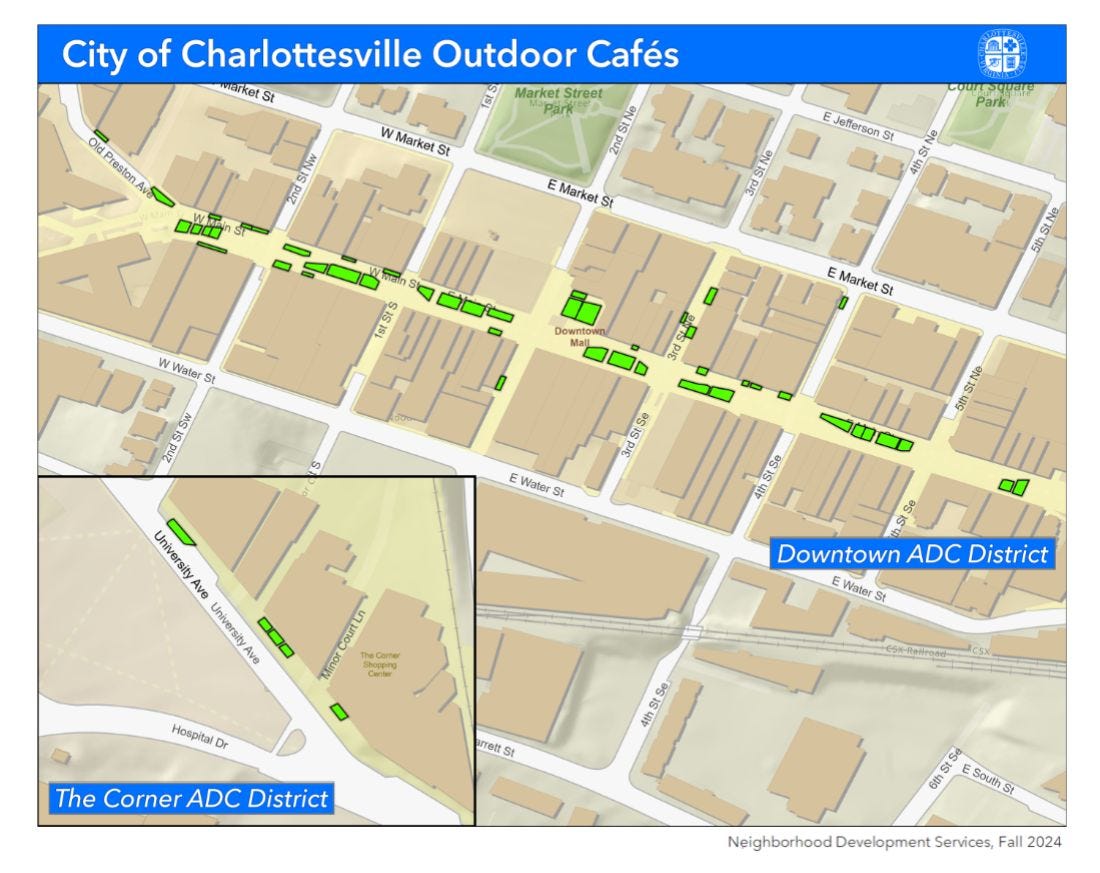
Louisa County Supervisors to approve partnership to build $88 million infrastructure project for two Amazon Data Centers
The Louisa County Board of Supervisors will meet at 5 p.m. for a routine closed session followed by an open session at 6 p.m. (meeting overview)
After the consent agenda and the public comment period, there will be a posthumous appreciation of Cy Weaver. There is no further information packet, but Weaver had been a member of the Planning Commission
There will be a discussion of a potential update of the animal control ordinance. There is no further information in the packet.
The first item under new business is a resolution to authorize an agreement and design build contract for infrastructure at one of the two planned Amazon data centers to be located in Louisa County. This consists of a raw water pumping station, raw water pipelines, two new wastewater pump stations and other equipment.
“The New Infrastructure will provide water and wastewater services to the North Creek Technology Campus on Jefferson Highway and the Lake Anna Technology Campus on the east side of the intersection of Haley Drive and Kentucky Springs Road,” reads the resolution in the packet.
The contractor is Louisa County Infrastructure, LLC, a company based in Albemarle County that was formed in May 2024. The company appears to be a subsidiary of Faulconer Construction as both share the same address at 2496 Old Ivy Road.
This is a partnership under the Public-Private Education Facilities and Infrastructure Act.
The contract includes language that the public must be notified of how the construction is going.
“Contractor shall maintain a website that will post weekly the progress of the project on a weekly basis including the expected work to be completed in the next two-week period,” reads the contract.
Jumping ahead to the end of the meeting, there is a public hearing on a budget allocation to cover the cost of building all of the above, which has a price tag of nearly $88 million.
“As per the County of Louisa's agreement with Amazon Web Services (AWS), the County will construct water and sewer utilities needed for the North Creek Technology Center and the Lake Anna Technology Center,” reads the resolution at issue in the public hearing. “WHEREAS, AWS has agreed to pay the County for all costs associated with the construction of the aforementioned water and sewer infrastructure.”
But for now, back to new business and action items.
The second item under business is to hire a third-party engineering work to review the work that Louisa County Infrastructure will do.
“The County has determined that in addition to in-house project management, the project inspections, materials testing, review of the project material submittals, monthly reports, and infrastructure commissioning should be performed in concurrence with a third-party engineering firm for a project of this size and complexity,” reads a resolution to pay JMT to do this work at a cost of $1,551,980.
The third item is to hire Theresa Born to be the county assessor. The county’s Commissioner of Revenue made the recommendation and County Code gives the Louisa Board of Supervisors the power to approve this hire. (read the resolution)
The fourth item is the adoption of an official policy on the siting of utility-scale solar facilities.
“Based on the increasing number of solar project proposals, establishing minimum standards within siting agreements will help protect county interests and ensure long-term benefits,” reads a section of the memo on the subject.
Under the agreement, utility companies will pay 0.1 percent of the county’s operating budget per megawatt of power produced. A quarter of these proceeds are to go to affordable housing projects. Projects must be completed within three years of being approved.
The agreement also requires the energy providers to pay $500 a year to each adjacent property owner.
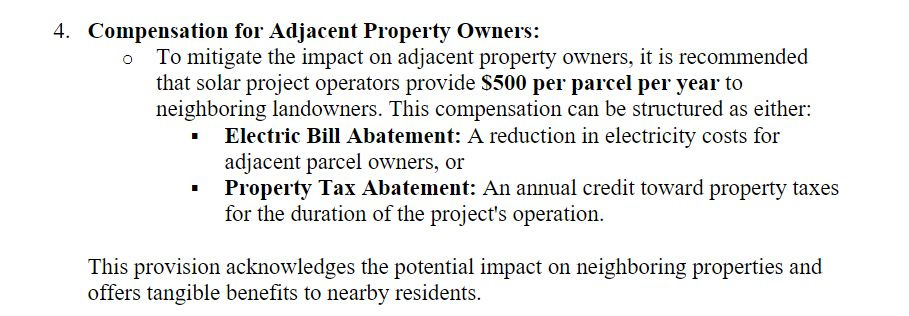
Carter Machinery request for outdoor sales goes before Places29-Hydraulic group
Earlier this year, a company associated with Carter Machinery purchased a 4.67 acre property to the east of the Northside Library for $3.53 million. Since then, they have opened a store that rents equipment ranging from hydraulic excavators to scissor lifts.
For now, all of the equipment must be kept indoors because to display any of it for sale outside requires a special use permit from the Albemarle Board of Supervisors. Such a request has been made and the first required community engagement step is a community meeting.
The Places29-Hydraulic Community Advisory Committee will serve as the venue for that meeting. They meet at Greer Elementary School at 190 Lambs Lane at 5:30 p.m. (meeting info)
If you want to review the materials, take a look at this folder on the Albemarle County’s Laserfiche website. You will need to log in and the site will prompt you how to do so.
The Architectural Review Board took a look at the request last week and had no objections to a design that reflected some of their earlier feedback. That’s according to the minutes from the meeting.
In one other meeting:
The Albemarle Architectural Review Board meets at 1 p.m. in Lane Auditorium with two items on the agenda. One is a review of High School Center 2 and the other is the design of a new car dealership building on Seminole Trail. (agenda) (meeting info)

Tuesday, November 19, 2024
Charlottesville Board of Architectural Review to review massing of potential 184 foot building at site of current Violet Crown
The new Development Code approved by City Council in December 2023 stripped away the role both Council and the Planning Commission play in individual projects unless there is a rezoning.
The Board of Architectural Review still retains some power to grant certificates of appropriateness for projects within architectural design control districts. More on that in a moment.
The appointed body meets Tuesday at 5 p.m. for a pre-meeting discussion with the regular version beginning at 5:30 p.m. This time around there are several items of interest. (meeting overview)
The first is a request to make exterior alterations at 946 Grady Avenue which is the first phase of the Dairy Central development that created a new chapter for the former Monticello Dairy. More on this in the next newsletter.
The second is for an art installation at 301 East Main Street. More on this in the next newsletter.
The third is for a consultation with the BAR on the design for emergency egress stairs at 116 West Jefferson Street. This may not be worth writing about in the next newsletter.
And here’s where things get interesting. The fourth and fifth items both have something to do with Heirloom Development, directly or indirectly.
The forth item for that comes from Cavalier Hospitality LLC, a firm that bought 218 West Market Street from Heirloom Development in September for $5.75 million. The company had gotten a special use permit under the old zoning code for a nine-story residential building, but asked the BAR earlier this year if they would support the conversion to a hotel instead.
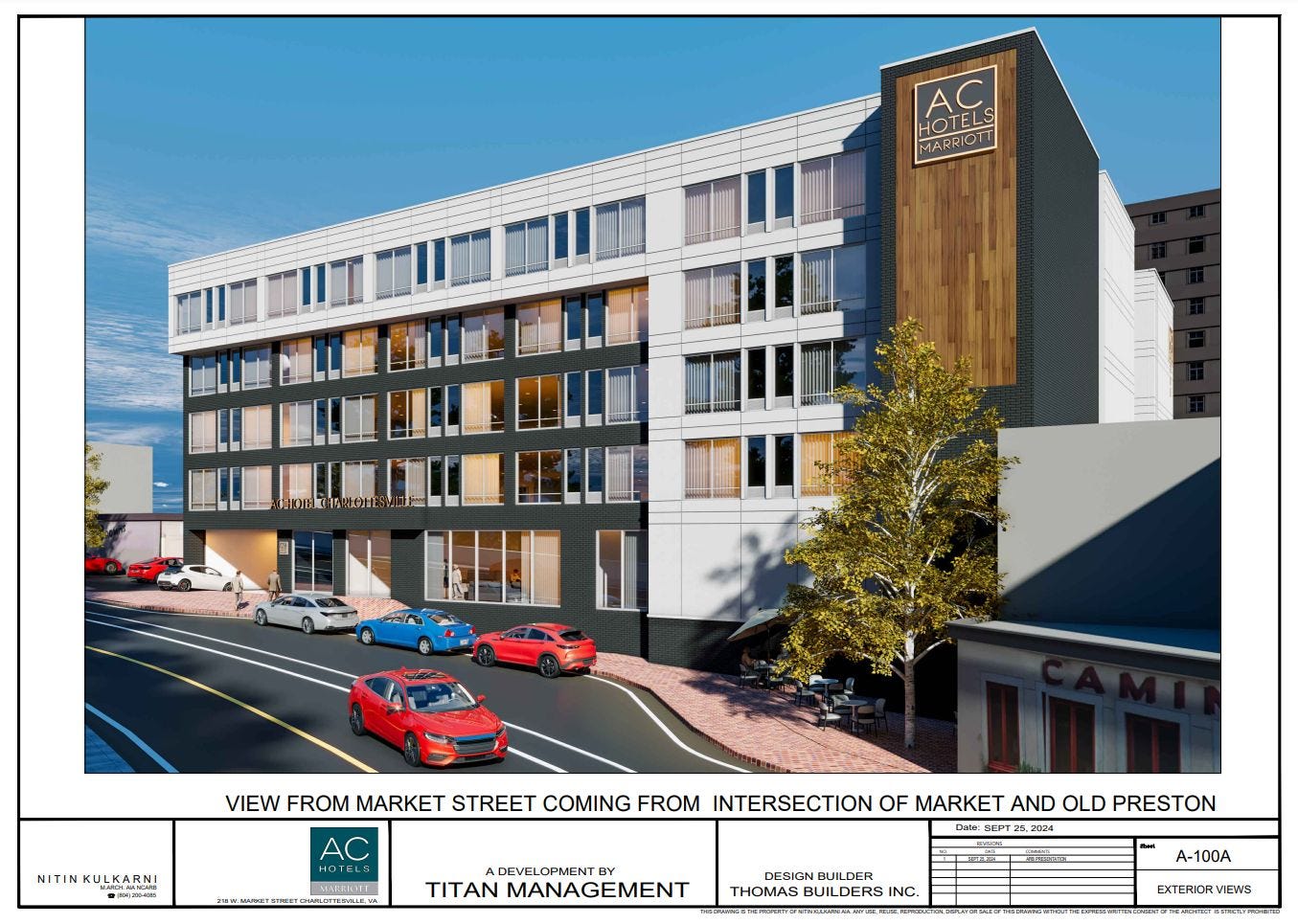
The fifth item is a preliminary discussion of a proposal from Heirloom Development related to 200 West Main Street. This caused a controversy last week when one media outlet jumped to the conclusion that closure of the Violet Crown theatre was inevitable. That possibility is not at stake in this discussion where Heirloom’s principal, Jeffrey Levien, wants to present the massing of an 184 foot tall structure, the maximum allowed under the zoning code. Heirloom is a contract purchaser, which means they have agreed to buy the property under certain conditions. Such contracts are not public.
It should be noted the BAR has nothing to do with affordable housing requirements enshrined in the new Development Code. The documents submitted state there would be 150 market rate units, which means Levien would need to pay into the city’s affordable housing fund. No appointed body has anything to do with that because the intent of the development code was to make the city’s expectations predictable.
Less than a year later this proposal seems to be the first major challenge. For more details, take a look at a story I wrote Friday afternoon.
The BAR does not regulate the use of a property, but only the aesthetics and the design. Their decisions on certificates of appropriateness can be appealed to Council.
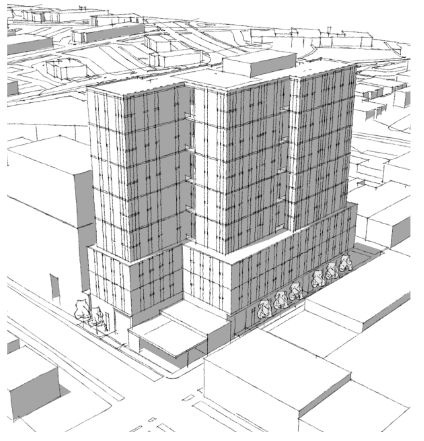
Albemarle Economic Development Authority to review agreement with Supervisors to give them more power
Imagine there’s a time traveler from 2004 who gets zapped from a public hearing in Lane Auditorium to the November 19, 2024 meeting of the Albemarle Economic Development Authority’s Board of Directors.
In 2004, a majority of the Board of Supervisors were opposed to the county actively seeking business opportunities. There was no office of economic development. Instead, there was a business facilitator. Opponents of economic development argued that deliberately attracting more industry would attract more residents, putting pressure on efforts to stop urban sprawl and preserve the rural area.
In the years to follow, the Board began to shift with the late Ken Boyd leading a call for economic vitality after the 2009 election brought two Republican allies to the Board. Democrats had taken body back over by 2013 and a majority continued to support economic development as a way of increasing the portion of county revenues that came from business.
As 2024 draws to a close, Albemarle has worked on a number of projects over the years including the Rivanna Futures project to keep the defense sector in the county and to expand the industry on county-owned land. There are also projects such as the expansion of Afton Scientific that was announced in October.
There were websites in 2004 so it’s fathomable our time traveling friend would know how to find the calendar item on the county’s website. That’s here, by the way. This meeting will be in Room 241 of the county’s office building at Room 241.
However, the calendar item does not list an agenda. Those on a list were sent the agenda and materials on November 13 and they are also posted on the website of the appointed body.
This is the agenda. The main item on the agenda is continued discussion of a memorandum of understanding (MOU) between the Economic Development Authority and the Board of Supervisors. Here’s a section of the minute from the October 15 meeting.
“[Chairman Don] Long suggested that the EDA should be more aggressive in how it used its authorized powers to acquire and sell land. He said that the old MOU had implied a hesitance to allow the EDA to use its full power, and they wanted to make it clear that the Board was not restricting the EDA in using its powers in support of the strategic plan and Project ENABLE.”
A vote on the new MOU is scheduled for this meeting. This is a link to that document. In years past, there were organizations that were actively involved in reviewing these documents. They don’t really do that kind of work anymore.
The minutes also state that there is to be a new entity at the University of Virginia called The National Security Data and Policy Institute. The federal government will invest $20 million over two years. Here’s more information.
“[Economic Development Director Emily] Kilroy said that the institute would facilitate connections with the intelligence industry and direct and pull resources for research,” reads the minutes.
There will be a closed meeting at which two economic development deals will be discussed. They might be the same one. Members of the public won’t know until the deal is announced. There are two exemptions requested under the Virginia Freedom of Information Act.
The location of a prospective industry in the Rio Magisterial District where no previous announcement has been made of the industry’s interest in locating its facilities in the community (subsection 5)
The investment of public funds for the location of an industry in the Rio Magisterial District, where bargaining is involved and where, if made public initially, would adversely affect the financial interest of the EDA and the County. (subsection 6)
Note there is no code name associated with this one either one in the agenda in the closed session motion. Has Albemarle moved away from such things?
Maybe the time traveler knows.
Albemarle County PC to hold AC44 work session on rural area land use policies
Work on Albemarle Comprehensive Plan resumed earlier this fall as staff began a gradual roll out portions of the draft document. I’ve written several stories for those who want to know what is being discussed.
New details on staff-led Comprehensive Plan update in Albemarle County, October 8, 2024
Albemarle PC begins review of new AC44 language on growth management, October 16, 2024
Albemarle Supervisors discuss growth management policy at AC44 work session,October 23, 2024
Albemarle Planning Commission briefed on land use chapter of new Comprehensive Plan, November 1, 2024
I have two other meetings I need to go through. The Board of Supervisors had a meeting on November 6 and the Planning Commission saw new material on November 12. I know a great deal of my paying subscribers want to know what’s happening, so that’s my job. No other media outlet seems to have the capacity or interest. So be it.
The dripping tap of AC44 continues on November 19 at an Albemarle Planning Commission work session that begins at 6 p.m. in Lane Auditorium. This is the first time there will be a direct discussion of rural area uses and the first look at the draft rural area chapter.
Materials:
Community meeting for private school on Dudley Mountain Road
Albemarle County’s Comprehensive Plan and zoning code both discourage uses in the rural area that so not support agriculture, forestry, or conservation. A question ultimately up to the Board of Supervisors is whether a private school on Dudley Mountain Road meets that definition.
Congregation Beth Israel seeks a special use permit for their Forest School to have a permanent home as private schools are not automatically allowed. They want to build several buildings for a total enrollment of about 140 students.
As with the Carter Machinery item listed above, a special use permit requires a community meeting. Special use permits and rezonings are usually in the development area and these meetings are held at community advisory committee meetings.
However, this one is in the rural area so this community meeting will be held at Walton Middle School at 4217 Red Hill Road. The meeting info page lays out what will happen when the discussion is over.
“Staff coordinates with partner agencies to receive their comments on the proposal and also incorporates what is said at the Community Meeting into their comments, then sends comments to the applicant. The applicant can proceed to the Planning Commission or request a deferral to work on revisions.
I wrote a version of this for C-Ville Weekly last week.
In other meetings:
The Virginia Passenger Rail Authority’s Board of Directors will meet at 10:30 a.m. on Tuesday, November 19 at 919 E. Main Street., in the Piedmont Room on the fourth floor. The meeting can also be streamed live on our YouTube channel.
The Albemarle Department of Social Services Advisory Board meeting will be held at 3:30 p.m. in the county’s office building at 1600 5th Street. This is likely a good meeting for anyone who wants to learn about the department given that one item on the agenda is ACDSS By the Numbers. (meeting info) (agenda)
Wednesday, November 20, 2024
Albemarle Supervisors to review five-year financial plan, hold AC44 discussion
The six member Board of Supervisors in Albemarle County will meet at 1 p.m. for the second meeting of the month. They meet in Lane Auditorium in the county’s office building at 401 McIntire Road. (agenda) (meeting info)
The first item on the agenda is a special exception request for a homestay on Gables Run. (item materials)
Then Supervisors will get information on the five-year financial plan, a key tool used in the development of the budget for each fiscal year. There is no information available in advance.
There is also an action item to schedule a public hearing on adoption of an ordinance to modify the real estate tax relief program for elderly and disable persons. (item materials)
In the evening session beginning at 6 p.m., there will be a review of the Development Areas Land Use chapter of the Comprehensive Plan. This is the same material that went to the Planning Commission on November 12. I’ve not written that up yet. (item materials)
As the length of this Week Ahead newsletter is getting up there, I’ll have items from the consent agenda in future editions of the regular newsletter.
Fluvanna Supervisors to take vote on removing rural area cluster provision
The Fluvanna County Board of Supervisors meet in the Circuit Courtroom in the Fluvanna Courts Building. This meeting begins at 6 p.m. (agenda packet)
There are two presentations related to health. The first is an update from the director of the Blue Ridge Health District. The presentation is in the packet and can be viewed here.
“I am confident that, together, we will continue to make strides in enhancing community, building partnerships, and providing the highest quality of service to those we serve,” writes director Ryan McKay in an introduction to the annual report included in the report.
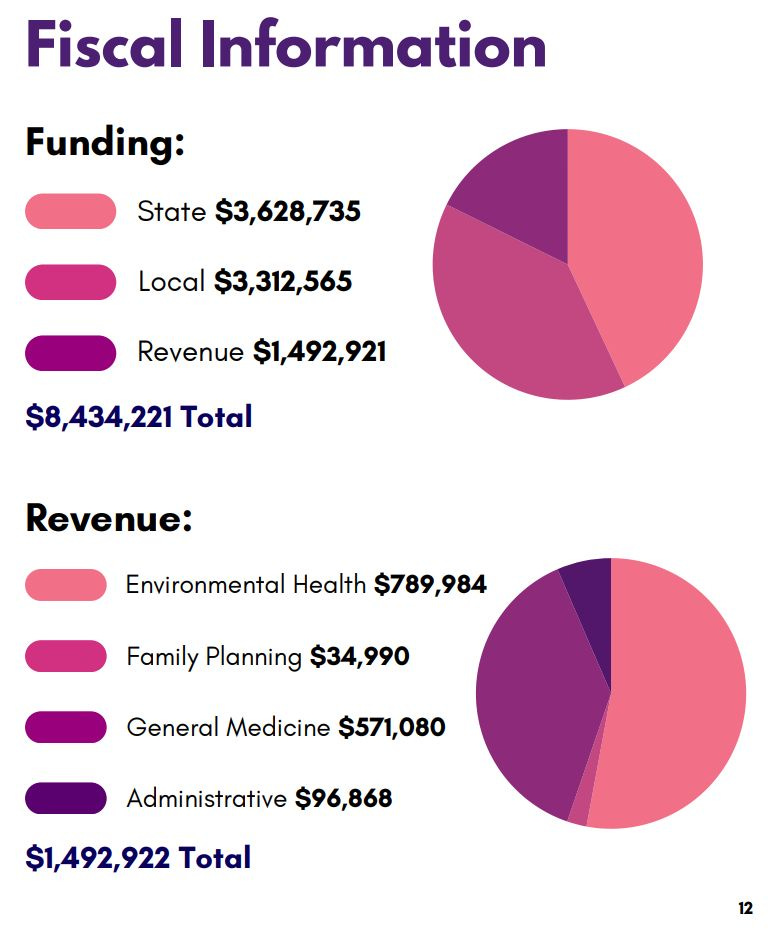
The second is an update on the MAPP2Health Community Health Assessment. Nelson County Supervisors had both of these updates at their meeting last week.
Under action items, there will be a vote to authorize an advertisement of a renaming of the Palmyra Magisterial District. The unincorporated are of Palmyra is no longer included within district after redistricting mandated after the 2020 U.S. Census. A notice must be sent to all registered voters notifying them of the process. (learn more)

There are five public hearings.
The first is an amendment to the county’s land use regulations to eliminate a provision called rural clustering that Fluvanna had been required after the 2010 Census because the county’s growth rate exceeded 10 percent since 2000. That was not the case after the 2020 Census. I had hoped to report from the Planning Commission’s meeting last week but there is no audio in the YouTube recording and I didn’t have a chance to follow-up. The Planning Commission recommended approval. This provision will make add regulations and steps to build in the rural area and these would the Board of Supervisors more direct control and allow neighboring property owners more steps to express their views. (learn more)
Second is an amendment to the county’s erosion and sedimentation control ordinance to comply with new regulations by the Virginia Department of Environmental Quality. This is similar to what Charlottesville City Council did back in June if you want to go back and see more details. (learn more)
The third is on a proposal to officially exempt agricultural equipment from the personal property tax rate. (learn more)
The fourth is a lease agreement with the Fluvanna Christian Service Authority for property at the Carrsbrook Complex. (learn more)
The fifth is to appropriate additional funding to Fluvanna County Public Schools related to the receipt of over $3.2 million in additional grants from state and federal sources. (learn more)

Greene County Planning Commission to hold work session on agritourism, public hearing on performance standards
Since being elected to the at-large Supervisors on the Greene County Board of Supervisors, Francis McGuigan has sought to shake up how the local government functions. The county’s Planning Commission will take up one of his proposals at a full meeting that begins at 6 p.m. at the county meeting room at 40 Celt Road. (meeting info)
The first item is on changing the county’s rules on agritourism. McGuigan has suggested changes that would limit what new wineries could do without getting approval from the Board of Supervisors.
Laws passed by the Virginia General Assembly in the 2010’s took away the ability of localities to outright ban the events from being held at wineries and other venues that can describe their activities as agritourism
“The Board of Supervisors has requested that the language for Farm Wineries, Farm Breweries, and Events at Agricultural Operations in the zoning ordinance be reviewed to provide for increased clarity and additional regulation of events, number of vehicles and people, and amplified sound,” reads the staff report for the work session.
State law forbids localities from banning tasting rooms, wine production, distribution, storage.
“No local ordinance regulating noise, other than outdoor amplified music, arising from activities and events at farm wineries shall be more restrictive than that in the general noise ordinance,” reads §15.2-2288.3 of Virginia Code.
McGuigan’s seeks to change Greene’s regulations to require a special use permit for any new winery. He also seeks to make clear that Greene will only allow 24 events a year before a special use permit is required. McGuigan also wants the total amount of attendees to be capped at 200 people.
McGuigan would also only allow events at wineries on property larger than ten acres.
What will the Planning Commission say?
For some background on why the rules are being suggested, here are some stories from other media outlets:
Greene PC recommends approval of controversial vineyard expansion amid community concerns, Knikki Hernandez, The Greene Journal, April 19, 2024
Neighbors upset about new vineyard in Greene County, Maggie Glass, 29News WVIR, July 24, 2024
Proposed Greene County winery, wedding venue sparks outrage, Jason Armesto, Charlottesville Daily Progress (paywall), July 24, 2024
In July, opponents of Beard Mountain Winery forced postponement of public hearing for event venue to this upcoming Tuesday night, Sean Tubbs, Information Charlottesville, August 245, 2024
Request denied to build large event space at Greene County Vineyard, Maggie Glass, 29News WVIR, August 28, 2024
There will also be a public hearing on changes to county code related to a technical aspect of land development.
“In 2020, the Board updated the zoning and subdivision ordinances to amend standards for performance bonds,” reads a portion of the staff report. “After additional review of the regulations, it was realized that the language needed further clarification.”
One of the changes is to add a requirement that a development agreement be made between the county and applicants that describe how the developer will make necessary improvements at the site to be compliant with various regulations.
The meeting concluded with a joint work session with the Town of Stanardsville’s Planning Commission to go over that locality’s Comprehensive Plan. This information is not provided in the packet.
In other meetings:
The Charlottesville Housing Advisory Committee is made up of various stakeholders in the realm of affordable housing, including the heads of non-profit groups that receive millions in funding from the city. They meet at noon in CitySpace and they’ll get an update on the land bank discussion, a topic that continues even as the city has helped the finance purchase of land this year by the Piedmont Housing Alliance, Habitat for Humanity of Greater Charlottesville, and the Charlottesville Redevelopment and Housing Authority. They’ll also talk about the ADU Manual. There is no advance material. Earlier this year, Alex Ikefuna of the city’s Office of Community Solutions told me that there is no requirement that any be made available to the public. (agenda)
The Nelson County Planning Commission meets at 7 p.m. in the General District Courtroom at 84 Courthouse Square in Lovingston. There is no agenda posted at publication time, so I’ll have a story in a future edition of the regular newsletter. (meeting info)
Thursday, November 21, 2024
5th and Avon Community Advisory Committee to get update on Housing Albemarle
Albemarle’s Community Advisory Committees play many roles, and one of them is to be a forum for information about county policy. One such policy is Housing Albemarle adopted by the Board of Supervisors in July 2021. The plan calls for construction of thousands of new units to accommodate projected population expansion.
This policy will go before the 5th and Avon Community Advisory Committee at their meeting at 7 p.m. in Room B of the county’s office building at 1600 5th Street Extended. (meeting agenda)
In other meetings:
The Charlottesville Parks and Recreation Advisory Committee will meet at 5:30 p.m. in the Parks and Recreation Department office at 5:30 p.m. On the agenda is a discussion of rules for garden lots and an update on Jenkins Park in the 10th and Page neighborhood. (agenda)
The Charlottesville Human Rights Committee meets at 6:30 p.m. in CitySpace. There is no agenda available at publication time. (meeting info)





